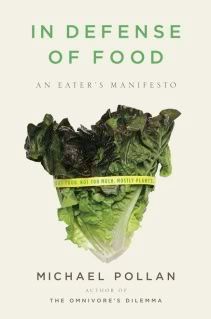Finally finished Michael Pollan’s The Defense of Food (and now well into The Age of Innocence, which I’m reading to keep my daughter company), and I have to say that I didn’t enjoy it nearly as much as I enjoyed The Omnivore’s Dilemma. It is a worthwhile read, but didn’t have the same kind of narrative pull for me.
I found myself impatiently reading the first 100 pages, wanting to skip ahead to the third section where Pollan explains, in detail, what he means by his eater’s manifesto: Eat food. Not too much. Mostly plants.
Even that section wasn’t as exciting as I’d hoped. You know, the whole preaching to the choir business. I already stick to the periphery of the grocery store when shopping, in fact, I avoid shopping at grocery store as much as possible – and try to work around our CSA basket and local Sunday farmer’s market. I did love that the premise of that whole third section was about trying to escape the Western diet. Growing up in an immigrant household, I have a leg up on that one, psychologically at least, because I’d have no problem switching to a full Korean diet anytime.
Good tips I did glean:
- Avoid food products containing ingredients that are a) unfamiliar b) unpronounceable c) more than five in number (good one!) or that include d) high-fructose corn syrup (oh no! can I really pass on a free Coke from the costco food court?)
- Eat mostly plants, especially leaves. – This is a hard one for me, but is one that I will really work on in 2010.
- If you have the space, buy a freezer. – More on CSA chicken and grass-fed beef in future posts.
- Pay more, eat less. – LOVE THIS CONCEPT. Now I just need to sell it to my husband… Also love the stats: “In 1960 Americans spent 17.5% of their income on food and 5.2% of national income on health care. Since then, those numbers have flipped: Spending on food has fallen to 9.9%, while spending on health care has climbed to 16% of national income.” Pollan’s point? You don’t get healthy by eating cheap food or WE PAY FOR CHEAP FOOD BY SACRIFICING OUR HEALTH.

